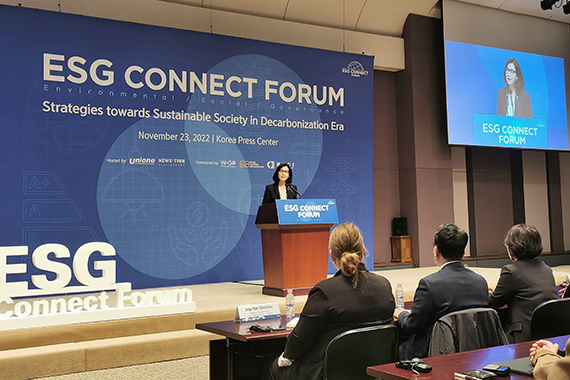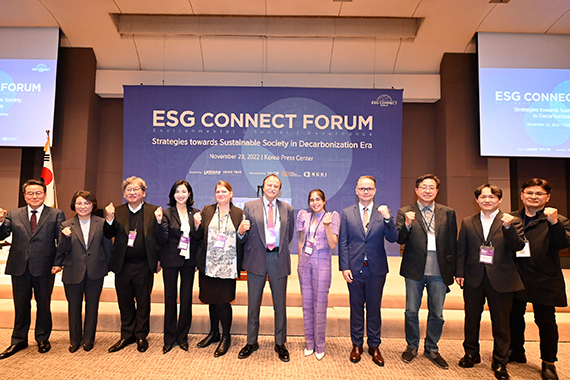WeGO Connects Smart City with ESG
SEOUL – In partnership with Seoul Tourism Organization, Korea Chamber of Commerce and Industry, and Unione Communications, WeGO hosted the ESG Connect Forum on November 23rd under the topic, ‘Strategies towards Sustainable Society in Decarbonization Era’ at the Korea Press Center.
ESG (Environment, Social, Governance) is the concurring new norm intertwined with corporations and smart city development. As the world faces intensifying challenges as environmental tensions grow, populations age and urbanize, and wealth and consumption increases, the culture of everyday citizens in smart cities is shifting, WeGO stands to be a part of the green transition in cities and people’s lives.
Global weather extremities and exacerbating climate change, urgent measures are impending from governments and corporations to effectuate the zero-carbon emissions policy. The ESG Connect forum provided an informative session to the issues in need of tackling and how companies or public institutions are incorporating ESG factors.
Leaders shared the developments made and the direction to forge ahead for the dire future transition. At this forum, Sang Hyup Kim, Chairman of the 2050 Carbon Neutrality Commission delivered congratulatory remarks focused on the keywords of loss and damage, referring to the destructive climate change impacts on people’s livelihood and the ecosystem.
In her congratulatory remarks, WeGO Secretary General, Jung Sook Park emphasized that smart cities with ESG-based practices promote the economic development of a municipality, region, or country through sustainable management of cities, which focuses on developing healthy ecological cities, incorporating citizens, and strengthening social and environmental engagement. Given these developments. She said, “It is essential that we further explore and strengthen the nexus between the ESG concept and smart city development.”
“Smart city is no longer a simple application of technology in city management. Smart city is the foundation that underlie the lives of citizens where the implementation of policies from economy, education, infrastructure, governance, welfare, environment, tourism, media to arts is not possible without smart city people, processes, and technology. Smart city is no longer just a “nice to have.” Smart city is a “must have” in today’s world.”
The last congratulatory remarks were made by Raphaelle Veronica Ortega-David, the Governor of La Union Province, Philippines. She is the youngest and the first female governor of La Union Province. La Union Province is a coastal province in the Philippines, a member city of WeGO and is one of the most active cities in the country working on creating a citizen centric smart city development. WeGO had an exclusive interview with the governor on La Union’s ESG initiatives.
Q: Could you tell us about La Union Province’s efforts in ESG initiatives?
A: For Environmental, coming into this governorship I met with my officers in the natural resources office and we discussed the priority programs. Due to potential water scarcity issues, we are looking into water bulk systems as well as rain water collectors per village called ‘barangays’ that can be environmentally sustainable and the ordinances and policies are being researched by the legislative body.
The next pillar is social, we are the first province to implement menstrual privilege. It gained a lot of national media traction when we released the executive order and it’s inspiring Local Government Units to adopt the same. Another is an executive order for breastfeeding moms to have allotted time for them to breastfeed their child and to have pumping privileges as well and creating these spaces inside the office to do their business.
For governance, La Union Province is also the first province to have all of our hospitals ISO IMS certified. So that’s a big step for us. We have IMS, integrated management systems, EMS environmental management systems so you can also put that for the environmental thrusts, and then we also have our occupational health and safety hazards (OHSH) so it’s making the workplace more suitable, efficient and conducive to all of the employees.
Q: What are some challenges La Union Province faces in implementing ESG strategy?
A: With smart cities, being a sustainable organization, in the Philippines, it’s an expensive venture. It’s a capital intensive program to adopt which is why we are exploring PPP possibilities for more accessible smart organizations that can help us transform into a smart city or province. Just recently we’ve been looking into the bulk water facilities to be a PPP, also a sports complex since La Union Province doesn’t have a sports complex yet to be a PPP as well. And also we don’t have a systematic public transport terminal yet so that needs to be addressed in our province.
Q: Which areas should La Union Province focus on in terms of sustainability for the future?
A: Right now I have what we call the PUSO agenda. Puso in english means heart. We really advocate love. Puso is an acronym. ‘P’ is for people-centered driven governance, ‘U’ is for universal access to basic needs. If the pandemic has taught us anything, it’s really the basics. We should really go back to the basics for all of our constituents to be sustained in the basic commodities that are needed for everyday survival. ‘S’ is for a sustainable and progressive economy. Again it’s a challenge for me to be the governor after the two year long pandemic because I have to see that the economy will get back on track leaning towards a more sustainable economy. ‘O’ is for orderly sustainable and resilient component towns. It’s going to the grassroots of the entire province. I want to be able to touch all the towns and all the villages or the ‘barangays’.
Q: Do you have specific cooperation with WeGO? Do you want to have any specific activities that you are interested in?
With regards to youth development, because that’s really one of the advocacies that I really want to be carrying during 3 years of my administration, so the Champions Program could be explored. I saw the advantage of having students be more involved in the government because many children have great ideas but they just don’t have the forum to speak it out. Giving them a platform to be able to raise their voices and concerns is important so that the government can address it as well. I would also like to explore possibilities in infrastructure. I was very inspired by Siemens, how they are able to create smart infrastructure that reduces their carbon emissions, so that’s to be explored in our province.
WeGO plans to incorporate the ESG framework in the entirety of future partnerships through the dialogue of forums, matchmaking WeGO members to companies through linking public-private entities. As the pressure surges to elevate sustainable development for the environment and the people, the actions of international organizations are integral.
About WeGO
The World Smart Sustainable Cities Organization (WeGO), established by 50 founding members in 2010, is an international association of city and other local governments, smart tech solution providers, and national and regional institutions committed to the transformation of cities into smart sustainable cities WeGO’s Secretariat is based in Seoul and supported by regional offices in Africa (Abuja, Nigeria), East Asia (Chengdu, China), Eurasia (Ulyanovsk Region, Russia), the Mediterranean (Beyoğlu, Turkey), and Latin America (Mexico City, Mexico).
WeGO has more than 200 members around the world and serves as their international platform to improve the quality of life, innovate in the delivery of public services, and strengthen regional competitiveness.
Press Contact:
Name: Jin Hwang
E-mail: jin.hwang@we-gov.org
Phone: 070-4209-9154




